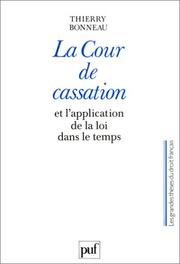| Listing 1 - 10 of 20 | << page >> |
Sort by
|
Book
ISBN: 1472560205 1281761338 9786611761332 1847314104 Year: 2008 Publisher: Oxford Portland, Oregon Hart Publishing
Abstract | Keywords | Export | Availability | Bookmark
 Loading...
Loading...Choose an application
- Reference Manager
- EndNote
- RefWorks (Direct export to RefWorks)
"This book analyses the common law's approach to retroactivity. The central claim is that when a court considers whether to develop or change a common law rule the retroactive effect of doing so should explicitly be considered and, informed by the common law's approach to statutory construction, presumptively be resisted. As a platform for this claim a definition of 'retroactivity' is established and a review of the history of retroactivity in the common law is provided. It is then argued that certainty, particularly in the form of an ability to rely on the law, and a conception of negative liberty, constitute rationales for a general presumption against retroactivity at a level of abstraction applicable both to the construction of statutes and to developing or changing common law rules. The presumption against retroactivity in the construction of statutes is analysed, and one conclusion reached is that the presumption is a principle of the common law independent of legislative intent. Across private, public and criminal law, the retroactive effect of judicial decisions that develop or change common law rules is then considered in detail. 'Prospective overruling' is examined as a potential means to control the retroactive effect of some judicial decisions, but it is argued that prospective overruling should be regarded as constitutionally impermissible. The book is primarily concerned with English and Australian law, although cases from other common law jurisdictions, particularly Canada and New Zealand, are also discussed. The conclusion is that in statutory construction and the adjudication of common law rules there should be a consistently strong presumption against retroactivity, motivated by the common law's concern for certainty and liberty, and defeasible only to strong reasons. 'Ben Juratowitch not only gives an account of the operation of the presumption, but also teases out the policies which underlie the different rules. This is particularly welcome. Lawyers and judges often seem less than sure-footed when confronted by questions in this field. By giving us an insight into the policies, the author provides a basis for more satisfactory decision-making in the future. ... The author not only discusses the recent cases but examines the question in the light of authority in other Commonwealth jurisdictions and with due regard to the more theoretical literature. This is a valuable contribution to what is an important current debate in the law. Happily, Ben Juratowitch has succeeded in making his study not only useful, but interesting and enjoyable.' From the Foreword by Lord Rodger of Earlsferry."--Bloomsbury Publishing This book analyses the common law's approach to retroactivity. The central claim is that when a court considers whether to develop or change a common law rule the retroactive effect of doing so should explicitly be considered and, informed by the common law's approach to statutory construction, presumptively be resisted. As a platform for this claim a definition of 'retroactivity' is established and a review of the history of retroactivity in the common law is provided. It is then argued that certainty, particularly in the form of an ability to rely on the law, and a conception of negative liberty, constitute rationales for a general presumption against retroactivity at a level of abstraction applicable both to the construction of statutes and to developing or changing common law rules. The presumption against retroactivity in the construction of statutes is analysed, and one conclusion reached is that the presumption is a principle of the common law independent of legislative intent. Across private, public and criminal law, the retroactive effect of judicial decisions that develop or change common law rules is then considered in detail. 'Prospective overruling' is examined as a potential means to control the retroactive effect of some judicial decisions, but it is argued that prospective overruling should be regarded as constitutionally impermissible. The book is primarily concerned with English and Australian law, although cases from other common law jurisdictions, particularly Canada and New Zealand, are also discussed. The conclusion is that in statutory construction and the adjudication of common law rules there should be a consistently strong presumption against retroactivity, motivated by the common law's concern for certainty and liberty, and defeasible only to strong reasons. 'Ben Juratowitch not only gives an account of the operation of the presumption, but also teases out the policies which underlie the different rules. This is particularly welcome. Lawyers and judges often seem less than sure-footed when confronted by questions in this field. By giving us an insight into the policies, the author provides a basis for more satisfactory decision-making in the future. ..The author not only discusses the recent cases but examines the question in the light of authority in other Commonwealth jurisdictions and with due regard to the more theoretical literature. This is a valuable contribution to what is an important current debate in the law. Happily, Ben Juratowitch has succeeded in making his study not only useful, but interesting and enjoyable.' From the Foreword by Lord Rodger of Earlsferry
Retroactive laws. --- Retroactive judicial decisions. --- Common law.
Book
Year: 2014 Publisher: Washington, DC : United States Sentencing Commission,
Abstract | Keywords | Export | Availability | Bookmark
 Loading...
Loading...Choose an application
- Reference Manager
- EndNote
- RefWorks (Direct export to RefWorks)
Crack (Drug) --- Sentences (Criminal procedure) --- Recidivism --- Prison sentences --- Retroactive judicial decisions --- Government policy --- Government policy
Book
Abstract | Keywords | Export | Availability | Bookmark
 Loading...
Loading...Choose an application
- Reference Manager
- EndNote
- RefWorks (Direct export to RefWorks)
Retroactive laws --- Intertemporal law --- Retroactivity (Law) --- Retrospective laws --- Constitutional law --- Due process of law --- Retroactive judicial decisions --- Vested rights
Book
ISBN: 3161468805 Year: 1998 Publisher: Tübingen Mohr Siebeck
Abstract | Keywords | Export | Availability | Bookmark
 Loading...
Loading...Choose an application
- Reference Manager
- EndNote
- RefWorks (Direct export to RefWorks)
Civil law --- Retroactive laws --- Intertemporal law --- Retroactivity (Law) --- Retrospective laws --- Constitutional law --- Due process of law --- Retroactive judicial decisions --- Vested rights
Book
ISBN: 9462654433 9462654425 Year: 2021 Publisher: The Hague, The Netherlands : T.M.C. Asser Press,
Abstract | Keywords | Export | Availability | Bookmark
 Loading...
Loading...Choose an application
- Reference Manager
- EndNote
- RefWorks (Direct export to RefWorks)
Book
ISBN: 3789020311 Year: 1990 Publisher: Baden-Baden : Nomos,
Abstract | Keywords | Export | Availability | Bookmark
 Loading...
Loading...Choose an application
- Reference Manager
- EndNote
- RefWorks (Direct export to RefWorks)
Retroactive laws --- -Retroactive judicial decisions --- -#RBIB:XTOF --- AA / International- internationaal --- 334.154.0 --- T01 Droit européen général - Algemeen europees recht --- Intertemporal law --- Retroactivity (Law) --- Retrospective laws --- Constitutional law --- Due process of law --- Retroactive judicial decisions --- Vested rights --- Decisions, Retroactive judicial --- Retrospective judicial decisions --- Judgments --- Prospective overruling --- Gemeenschapsrecht. Integratie van de wetgeving: algemeenheden. --- #RBIB:XTOF --- Gemeenschapsrecht. Integratie van de wetgeving: algemeenheden

ISBN: 3211834117 9783704660398 9783211834114 Year: 1999 Volume: 129 Publisher: Wien Springer
Abstract | Keywords | Export | Availability | Bookmark
 Loading...
Loading...Choose an application
- Reference Manager
- EndNote
- RefWorks (Direct export to RefWorks)
Retroactive laws --- Retroactive judicial decisions --- Civil law --- 347 <436> --- Intertemporal law --- Retroactivity (Law) --- Retrospective laws --- Constitutional law --- Due process of law --- Vested rights --- Decisions, Retroactive judicial --- Retrospective judicial decisions --- Judgments --- Prospective overruling --- 347 <436> Burgerlijk recht. Privaatrecht--Oostenrijk --- Burgerlijk recht. Privaatrecht--Oostenrijk --- Retroactive laws - Germany --- Retroactive judicial decisions - Germany --- Civil law - Germany

ISBN: 2130428274 9782130428275 Year: 1990 Publisher: Paris Presses universitaires de France
Abstract | Keywords | Export | Availability | Bookmark
 Loading...
Loading...Choose an application
- Reference Manager
- EndNote
- RefWorks (Direct export to RefWorks)
Public law. Constitutional law --- France --- Versted rights --- Retroactive laws --- Droits acquis (Droit) --- Rétroactivité des lois --- France. --- Rétroactivité des lois --- Intertemporal law --- Retroactivity (Law) --- Retrospective laws --- Constitutional law --- Due process of law --- Retroactive judicial decisions --- Vested rights
Multi
ISBN: 9782247136469 224713646X Year: 2014 Volume: 134 Publisher: Parijs Dalloz
Abstract | Keywords | Export | Availability | Bookmark
 Loading...
Loading...Choose an application
- Reference Manager
- EndNote
- RefWorks (Direct export to RefWorks)
Law of civil procedure --- Legal theory and methods. Philosophy of law --- France --- 347.9 <44> --- 347.9 <44> Gerechtelijk privaatrecht. Burgerlijk procesrecht. Burgerlijke rechtsvordering.--Frankrijk --- Gerechtelijk privaatrecht. Burgerlijk procesrecht. Burgerlijke rechtsvordering.--Frankrijk --- Law --- Judicial power --- Retroactive judicial decisions --- Judges --- Jurisprudence --- Pouvoir judiciaire --- Rétroactivité des jugements --- Juges --- Cases
Book
ISBN: 9782275053530 2275053530 Year: 2016 Publisher: Issy-les-Moulineaux LGDJ
Abstract | Keywords | Export | Availability | Bookmark
 Loading...
Loading...Choose an application
- Reference Manager
- EndNote
- RefWorks (Direct export to RefWorks)
S'interroger sur la rétroactivité de la jurisprudence c'est, en réalité, se poser trois questions, lesquelles dictent les trois parties de la présente thèse. La jurisprudence est-elle véritablement rétroactive ? La réponse apportée est affirmative. Un détour nécessaire par la philosophie du droit a ainsi été effectué pour montrer que le juge créait des règles de droit. Pourquoi la jurisprudence est-elle rétroactive ? La réponse réside à la fois dans une explication technique et dans une explication juridique. Techniquement, la jurisprudence est rétroactive, car elle s'incorpore à la règle prétendument interprétée. Juridiquement, cette incorporation est justifiée par les rapports historiques noués entre la loi et la jurisprudence, par la prohibition des arrêts de règlement qui interdit au juge de poser une règle à la manière du législateur. Que faire pour remédier à l'insécurité juridique provoquée par cette rétroactivité ? Deux solutions seulement paraissent pleinement efficaces : soit permettre à la Cour de cassation de rendre des arrêts de règlement, soit introduire une sorte de référé législatif permettant à la Cour de cassation de demander au législateur de modifier directement la norme estimée inadaptée. C'est à une proposition de restauration du référé législatif qu'aboutit la présente thèse.
Law of civil procedure --- France --- Legal certainty --- Retroactive judicial decisions --- Retroactive laws --- Sécurité juridique --- Rétroactivité des jugements --- Rétroactivité des lois --- France. --- Principe de non-régression (droit) --- Droit --- Droit créé par le juge --- Jurisprudence --- Interprétation --- Sécurité juridique --- Rétroactivité des jugements --- Rétroactivité des lois
| Listing 1 - 10 of 20 | << page >> |
Sort by
|

 Search
Search Feedback
Feedback About UniCat
About UniCat  Help
Help News
News